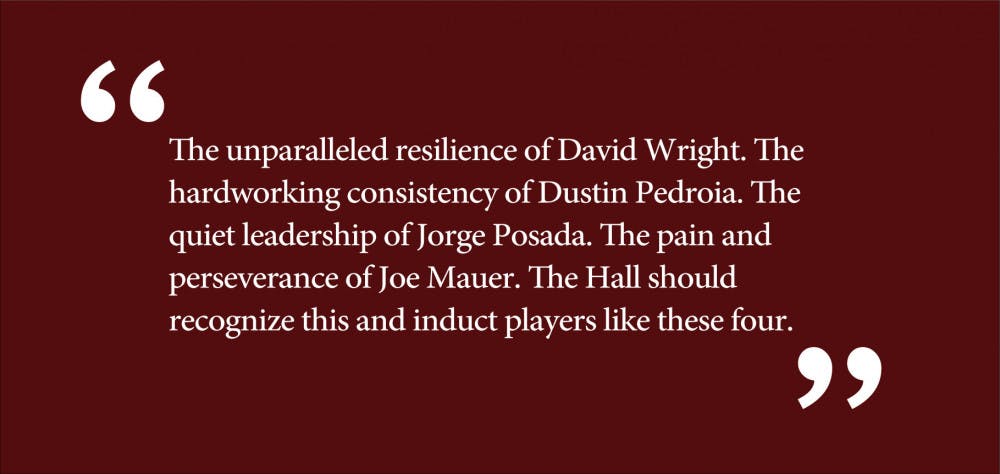I was in New York last weekend to see David Wright’s last game as an active player. Wright played third base for the New York Mets, and has done so since 2004; at the end of the 2018 season, he played his last game, brought down by a deadly combination of back and shoulder injuries. The paid attendance on Saturday night, when Wright started at third for the last time, reached almost 44,000 — the Mets’ highest home attendance this season besides Opening Day. Wright took two at-bats and then left the field in the top of the fifth. There was not a dry eye in the house, and Wright’s final standing ovation lasted so long that the congratulatory song the Mets were playing ended before the clapping did.
It really makes you think, or at least, it did to me: How can players like this not be Hall of Famers? Or alternatively, there’s a broader question: How should the Baseball Hall of Fame treat players like this — who may not have the typical qualifications to earn entry — but are beloved by their fans, and have become leaders and even captains of their teams? To me, the answer is obvious: These players belong in the Hall of Fame.
Now, I’m not just talking about Wright, because that would be nothing more than my fandom talking. I mean this whole class of players. Players universally beloved and respected by baseball experts and fans. Players who may not quite have the statistical records to match up with historical Hall of Famers, but all the same give off an unmistakable, almost indescribable sense of greatness.
Interestingly enough, another example offered itself up almost immediately after the Mets game. The day after Wright played his final game, Joe Mauer of the Minnesota Twins appeared to do the same. Mauer used to be a catcher; after multiple concussions he became a first baseman and designated hitter. Mauer’s and Wright’s stories are almost identical. Both were unquestionably elite offensive players but both fell short of conventional Hall of Fame levels. Both spent their entire careers with a single team from 2004 to 2018. Both became the unquestioned leaders of their teams. And both will now fade, apparently, into baseball oblivion.
Let me cover all my bases, literally and figuratively. Here are two other similar players: Dustin Pedroia and Jorge Posada. Both spent their entire careers with a single team, the Boston Red Sox and the New York Yankees respectively. Both were offensively elite for their positions — second base and catcher, both usually positions from which relatively little offense is expected — but not to Hall of Fame levels. And both are almost universally respected. I am a well-known Yankee hater, and even I appreciate the career that Posada had. After Pedroia retires, similarly, I suspect that he will also be held in the same esteem.
These four players — Wright, Mauer, Pedroia and Posada — do not have the raw numbers to make the Hall of Fame. That much I concede without argument. But the Hall of Fame induction process should be about more than numbers. Obviously, to some extent it already is: Barry Bonds and Roger Clemens are not in the Hall of Fame right now because they cheated, even though their numbers are better than most anyone else’s. Roberto Clemente, after the plane crash that took his life as he attempted to fly earthquake aid to Nicaragua, was inducted into the Hall of Fame immediately rather than going through the traditional five-year waiting period. This wasn’t because his numbers were better than anyone else’s — it was because of the person that Clemente was, which made the tragedy of his death hurt all the more.
With players like the four I’ve listed, the Hall of Fame should take a similar, holistic approach. The Hall should be a repository for baseball greatness, and baseball greatness comes in many forms. It’s not just the ability to hit 600 home runs or bat .340. Rather, sometimes baseball greatness manifests itself in other ways. The unparalleled resilience of David Wright. The hardworking consistency of Dustin Pedroia. The quiet leadership of Jorge Posada. The pain and perseverance of Joe Mauer. The Hall should recognize this and induct players like these four.
Critics will say that this opens the door for any everyday player to undeservingly become a Hall of Famer, but that argument falls short. It fails for the simple reason that it assumes these qualities are a dime a dozen. Things like Wright’s resilience and Pedroia’s consistency aren’t easy to find. If they were, there wouldn’t be anything special about any of these players, and it’s evident, from the love they generate from their fanbases and the universal respect they command throughout baseball, that there’s something special about each of them. Just like it’s not easy to hit 600 home runs, it’s not easy to be a great leader. They’re different kinds of talents, but both are forms of greatness.
After the Mets game on Saturday ended with a 1-0 Mets walk-off win in the 13th inning — I was tearing my hair out in the stands by then — Wright came back out onto the field for the last time and addressed the crowd. “I wish I could thank everybody individually,” he said. “But the best I can do is say thank you from the bottom of my heart for accepting me, thank you for cheering for me and thank you for allowing me to live out my dream in front of you guys, each and every single night.” He stopped for over 20 seconds while we applauded. Then he said, “you’re going to make me cry again. I love you guys.”
Greatness, as I say, isn’t hard to recognize. Let’s just hope Hall of Fame voters were listening.
James Schapiro '19 can be reached at james_schapiro@brown.edu. Please send responses to this opinion to letters@browndailyherald.com and op-eds to opinions@browndailyherald.com.





